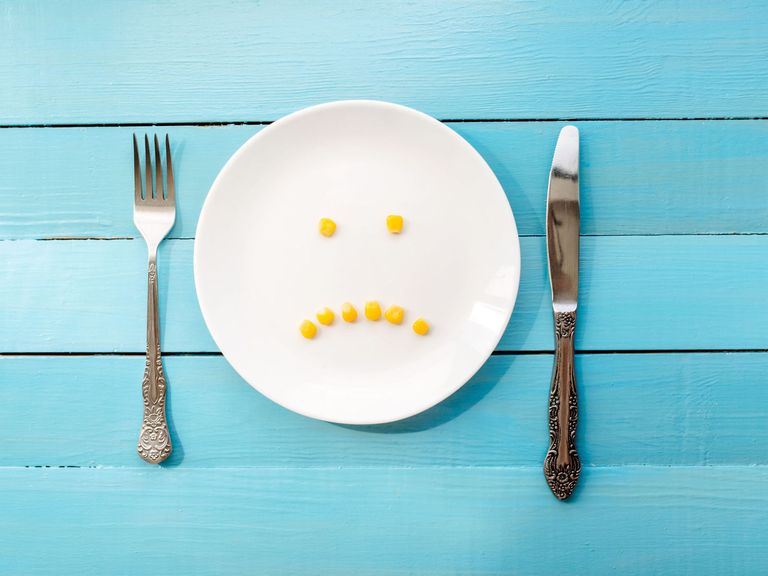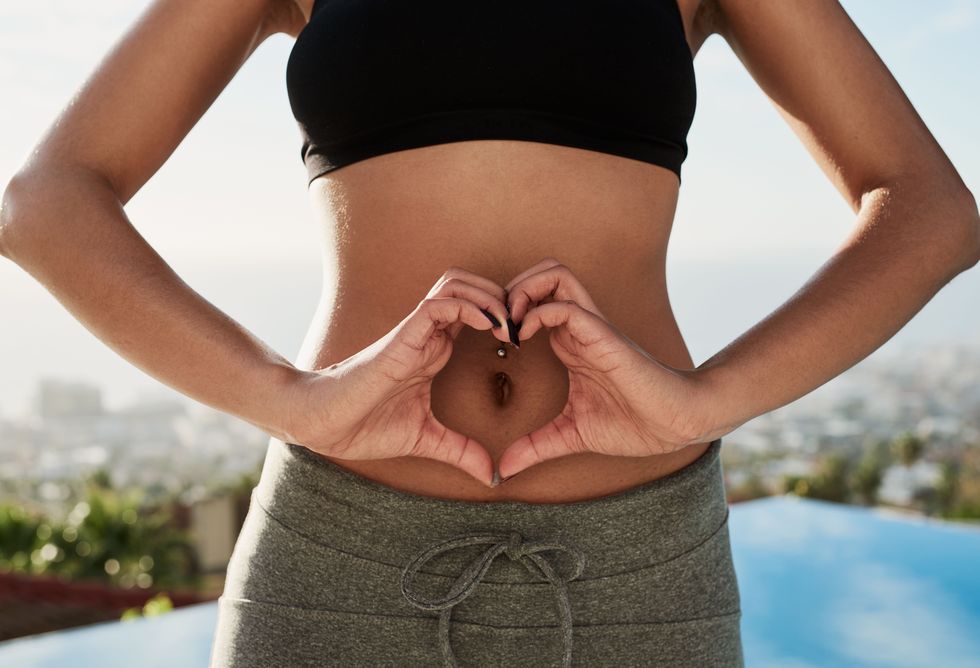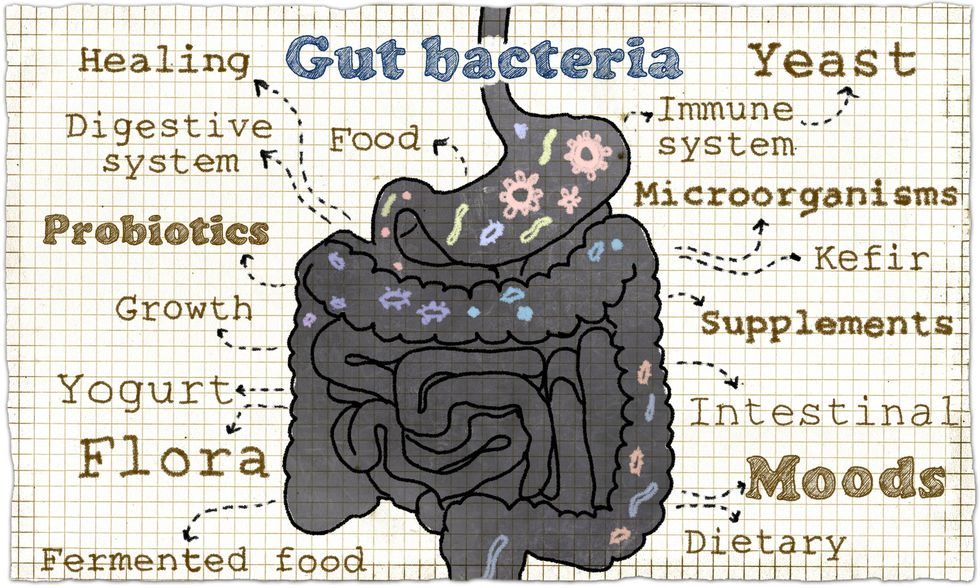'I think 2018 will be the year that people start to understand how important gut health is,' said Karen O'Donoghue, founder of east London bakery, The Happy Tummy Co.
Specialising in high fibre, wholegrain breads and bakes, she's lithe and clear-skinned, with an infectious Irish enthusiasm. We met for the first time in January when she hosted a dinner at the Soho-based fermented food pop-up, Kultured. Then, like now, she spoke about the gut with the clear-eyed zeal of someone who's set on converting the world to her way of thinking.
Now it's fair to say that I've fallen down my share of wellness rabbit holes. New trends wash ashore like driftwood on the cultural tide: tangled, and odd-looking; lacking provenance or any real meaning. And while in my heart I so often want to believe the magical, quick-fix-iness of it all, as the years have worn on my tolerance for Instagram 'nutritionists' and bullshit pseudo-science has shrunk. I realised that eating a varied, balanced diet would leave me more glowy and fulfilled than any juice cleanse ever could.
I realised, in short, that there is no magic pill.
So when I first butted-up against this particular trend, my bullshit-o-meter went into overdrive. And yet, the more I delved, the less it seemed like Yacult-sponsored science. In fact, I discovered a health revolution that for once seemed completely legit. And it has been slowly drip-dripping into the mainstream via 'functional food' outlets like The Happy Tummy Co. and Kultured. And via brands like Eaten Alive, Bio-tiful and the Urban Fermentery.
Brain Food
Gut health: in basic terms it means looking after the the ecosystem of bacteria, fungi, viruses and yeasts (called the microbiome) which live in our intestinal tract.
Why? Well, proponents claim that a healthy microbiome can reduce chronic inflammation (basically, this is our body's immune response to stress and has been linked to everything from arthritis to cancer). Even more fascinatingly, our microbiome may also be the key controlling our emotions.
Dr Mithu Storoni is a Cambridge University-trained neuroscientist who has spent her career exploring the effects and implications of chronic stress. 'A healthy gut is supremely important when we talk about regulating emotion,' she says. Her most recent book - Stress Proof: the scientific solution to building a resilient brain and life - has a whole section dedicated to the gut-brain axis. 'It's a very exciting area of research.'
The ecosystem, or microbiome, that thrives in our intestinal tract weighs more than 2kg. That means that for most of us, our gut microbiome weighs more than our brain. 'The link between the gut and the brain still isn't fully understood,' explains Storoni. 'But we now know that the bugs in our gut produce many of the transmitters and hormones that are effective within the brain. For instance, they produce serotonin.' It helps to regulate mood, social behaviour, appetite, digestion, sleep and sexual desire and some studies have found that up to 95% of our body's serotonin is produced in the gut. 'Which goes some way to explaining why an imbalanced microbiome can have such a huge impact on our emotional lives.'
The impact is so huge, in fact, that a centre in the US is even running a trial using probiotics to treat war veterans with very pronounced PTSD. And their findings, that simple bacterial cultures, taken like a food supplement, can impact the way our bodies and minds respond to trauma, are remarkable.
Healthy Body, Healthy Mind
And that's just the emotional side. It was O'Donoghue's chronic IBS, or irritable bowel syndrome,that pushed her to found The Happy Tummy Co. IBS is a name given to a group of symptoms that have no known cause. It affects around 20% of us and, weirdly, women are twice as likely to suffer from it as men. 'I had daily pains across my back and abdomen,' says O'Donoghue. 'It was just a miserable condition to live with.'
As well as causing sufferers to have terrible pain, IBS has also been linked to depression; in fact a number of studies have shown that 30 - 40% of people with IBS also suffer from anxiety and depression (compare that to the 7.8%, within the general population who suffer from the disorders). For years scientists believed that it was a mind-body thing - your brain dominating your body, your sadness causing your stomach to twist in knots. 'But there are now some studies looking into whether it might not be the other way around,' says Storoni.
It was a determination not to resort to medication that led O'Donoghue to develop a type of cultured, high-fibre bread. 'I was like a mad scientist, doing all these experiments in my kitchen to work out the exact quantities of fibre and prebiotics that my body needed.' When she hit upon the right recipe though, 'within a few weeks, my brain functionality improved - my attention span, in particular, but also my happiness levels. I was feeling much more level; my moods, instead of fluctuating wildly from one hour to the next, were steady and constant. And my pain disappeared.'
And all from eating bread.
Your Gut Is A Garden
Which, admittedly, is starting to sound a bit too good to be true. As Storoni points out, though, hacking your microbiome isn't a magic cure for either mental or physical ailments ('the research is still in the relatively early stages') but making small changes, like O'Donoghue did by adding whole grain fibre to her daily diet, may be a step in the right direction. 'Fibre is important because it feeds the gut bacteria,' explains Storoni. 'But many modern diets are woefully low in it.'
If you think of your gut as a garden, then fibre is the fertilizer. She recommends eating some soluble fibre (think brown bread, whole wheat pasta, potatoes with skin and nuts and seeds) at least once a day.
To up the diversity of your microbiome (the more gut bugs and fungi that you have, the more you'll benefit), try eating more 'probiotic' foods. Probiotics are live cultures of bacteria that you find in fermented foods and drinks like live yogurt, kombucha and kefir (a fermented milk product), as well as sauerkraut and kimchi.
'All cultures have their own version of fermented products, so you don't necessarily have to go for weird or expensive ones. Randomised control studies published in Japan found that eating fermented milk products, like yogurt, over a short period of time reduced the participants' anxiety; they also got better at handling stressful situations without necessarily getting stressed,' says Storoni.
And they started to feel the benefits within a matter of weeks.
Still, once or twice a week isn't quite enough to nix the neg. 'Eating fermented products on a regular basis improves the range and density of gut bacteria, but by 'regular' I mean with every meal,' she continues.
In Japan, for instance, every meal is accompanied by a little bowl of miso soup. 'That's great,' says Storoni. 'But if you try something like that, then be sure to make the miso with hot water, not boiling, or you'll kill the live cultures.'
There's also good evidence to suggest that small amount of red wine can be beneficial to gut bacteria (well, it is fermented), while too much processed fast food can cut your microbiome diversity by as much as 40% in under two weeks. Ever wondered why eating badly makes you feel a bit drab and depressed?
Yup, most likely your microbiome has been thrown out of whack and you're not producing the right hormones.
But as Storoni points out, these are all just good, gut-boosting extras, 'all of this needs to be underpinned by a varied diet which should include a rainbow of fruits and vegetables, as well as those healthy whole grains.'
So, I guess, like all good health trends it comes back to balance and variety.
*Swigs her kombucha*
















